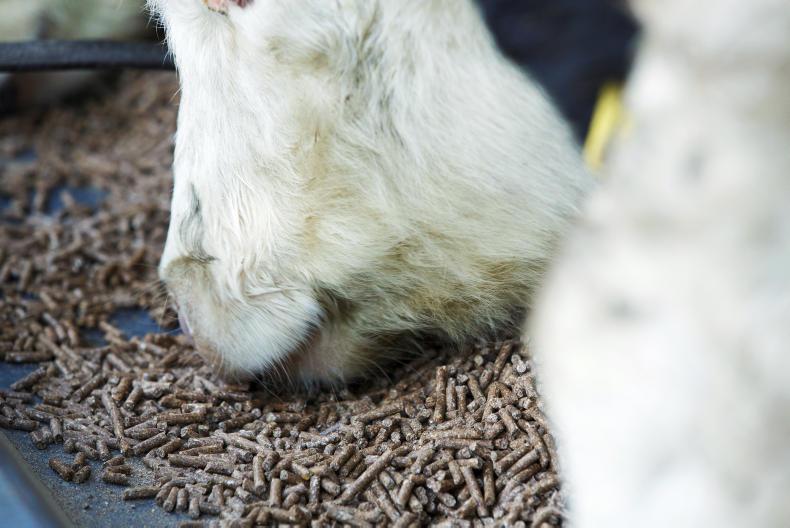Feed mills are reporting a jump in demand of up to 80% in extreme cases compared to this time last year, due to the prolonged housing of stock as the fodder crisis continues. Other feed mills say demand is up between 30% to 50%.
Glanbia has confirmed that feed sales continue “at record levels”, while Aurivo stated that April meal tonnage was running 80% ahead of last year.
Glanbia also stated that a second load of Alfalfa from Spain that arrived last weekend had been fully allocated and demand for imported fodder was falling as the weather and grass growth improved.
However, the situation varies, with Drinagh Co-op telling the Irish Farmers Journal that they have 90 farmers looking for fodder, with their first imported load expected from the UK on Thursday, as sourcing fodder in Ireland had become “very difficult”.
The upsurge in demand for meal to supplement fodder reserves has had a knock-on effect on feed deliveries, with farmers having to wait a number of days to receive orders.
“We have a waiting list of about three days,” Howards Feeds in Mallow, Co Cork, said.
“In terms of tonnes, the first 10 working days of April this year were the same as the whole of April last year.
“People are panicking, if they know the mill will be closed at 2pm, they’ll be here waiting at 1pm.”
Grennan’s Feeds in Co Offaly confirmed that demand was running about 50% ahead of where it was last year, across the board for sheep, dairy and beef farmers, with a delay in delivery of three to four days.
Lisavaird has been receiving a load of imported fodder a week, with increasing enquiries from farmers for straw for calf bedding, and confirmed they have had to stop selling some straights in order to save them for mixes.
Teagasc has advised farmers to be aware of animal health considerations due to prolonged housing, with instances of calf scour and pneumonia, and mastitis in dairy cows, compounding fodder issues for many farmers.
Minister Michael Creed defended his response to the fodder crisis this week, saying his Department “acted at all times in appropriate and measured ways as this story evolved”.
Read more
Strong cross-party support for motion on fodder
‘Farmers are at breaking point’ – Healy
Feed mills are reporting a jump in demand of up to 80% in extreme cases compared to this time last year, due to the prolonged housing of stock as the fodder crisis continues. Other feed mills say demand is up between 30% to 50%.
Glanbia has confirmed that feed sales continue “at record levels”, while Aurivo stated that April meal tonnage was running 80% ahead of last year.
Glanbia also stated that a second load of Alfalfa from Spain that arrived last weekend had been fully allocated and demand for imported fodder was falling as the weather and grass growth improved.
However, the situation varies, with Drinagh Co-op telling the Irish Farmers Journal that they have 90 farmers looking for fodder, with their first imported load expected from the UK on Thursday, as sourcing fodder in Ireland had become “very difficult”.
The upsurge in demand for meal to supplement fodder reserves has had a knock-on effect on feed deliveries, with farmers having to wait a number of days to receive orders.
“We have a waiting list of about three days,” Howards Feeds in Mallow, Co Cork, said.
“In terms of tonnes, the first 10 working days of April this year were the same as the whole of April last year.
“People are panicking, if they know the mill will be closed at 2pm, they’ll be here waiting at 1pm.”
Grennan’s Feeds in Co Offaly confirmed that demand was running about 50% ahead of where it was last year, across the board for sheep, dairy and beef farmers, with a delay in delivery of three to four days.
Lisavaird has been receiving a load of imported fodder a week, with increasing enquiries from farmers for straw for calf bedding, and confirmed they have had to stop selling some straights in order to save them for mixes.
Teagasc has advised farmers to be aware of animal health considerations due to prolonged housing, with instances of calf scour and pneumonia, and mastitis in dairy cows, compounding fodder issues for many farmers.
Minister Michael Creed defended his response to the fodder crisis this week, saying his Department “acted at all times in appropriate and measured ways as this story evolved”.
Read more
Strong cross-party support for motion on fodder
‘Farmers are at breaking point’ – Healy






 This is a subscriber-only article
This is a subscriber-only article










SHARING OPTIONS: